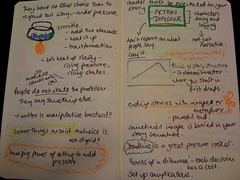Exactly a year ago, I wrote about how ebooks are the future. Today I read that the Oxford English Dictionary, the mighty volumes that record our very language itself, will only be available online. You can read a bit about that here.
Now, I’m a speculative fiction writer. I love science fiction. I’ve said this before – my iPhone does way more than Captain Kirk’s communicator could ever do. The iPad is suspiciously like Star Trek: The Next Generation‘s PADD (Personal Access Display Device). Incidentally, check out the gibberish on the PADD screen in the picture below. Are we really surprised that things like a multi-volume behemoth are crumbling under the weight of online use? We can’t have the future and the past together. That’d be some weird time twister where everyone’s confused.
As a writer, I often use a dictionary to check words. You know which one I use most? www.dictionary.com. I have a beautiful printed dictionary, in fact I have a few, but I rarely use them. If I’m not at my computer, I use the dictionary.com app on my iPhone. It’s easy and it’s good for the planet. You can hear the trees breathing a sigh of relief.
But you may also remember me gushing about how much I love Angela Slatter’s new book. Not just because it’s awesome storytelling, but because the physical book is just a beautiful thing to hold and behold. It was limited to 300 copies. Here’s a relevant quote from my previous post a year ago, that I linked at the start of this one:
But here’s my prediction – 99% of the books of the future will be either electronic or Print-On-Demand. Within twenty years or so traditional off-set print runs will be used exclusively for high-end collectors edition books.
I know – quoting myself. What a wanker. But you get my point. We have to accept that these things are happening and we have to accept that it’s not a bad development. I heard a statistic on the radio today that by the end of next year, one in ten books bought will be ebooks. Ten per cent of market share. That’s a lot for a new technology. It’s already around the three to five per cent mark. But literacy rates are expected to go up as well, as more people will have access to more reading options more often.
That 20 year estimate in my quote above could be grossly inaccurate. It might all happen far quicker than that. It’s the future people. Embrace it. Real books aren’t going anywhere, because too many of us love them. But the face of reading is changing just like the nature of book buying and book publishing is changing. Don’t be scared – it’s all really quite exciting.
EDIT – There’s been a fair amount of chatter about this post on Twitter and other places and one of the things that keeps getting mentioned again and again is, more or less, “I just hate reading from a screen, simple as that.”
Well, it’s worth noting that ebook readers are evolving rapidly too. Already the Kindle and other e-ink devices are replicating the printed page very well. Screens will soon be so advanced that they’re just like a printed page. And isn’t that deliciously ironic. Accept it – we already live in a digital future. The Schwarzschild radius has long since passed.
This is a cross-posting from Alan Baxter‘s The Word.


